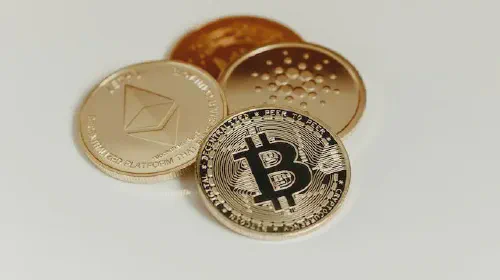Protect Your Cryptocurrency: Tips to Prevent Scams and Fraud
Salomon Kisters
Feb 20, 2023This post may contain affiliate links. If you use these links to buy something we may earn a commission. Thanks!
Cryptocurrency has become one of the hottest topics in the world of finance in recent years, and with good reason. Bitcoin, the world’s first cryptocurrency, was launched in 2009 and has since gone on to become the most popular cryptocurrency in the world.
The benefits of cryptocurrency include faster, cheaper, and more secure transactions than traditional payment methods. However, along with the rise in popularity of cryptocurrency, there has also been a corresponding increase in scams and online fraud.
From fake initial coin offerings (ICOs) to Ponzi schemes and phishing scams, fraudsters have found ways to take advantage of unsuspecting investors who are looking to make a quick profit. In recent years, the prevalence of crypto fraud has only increased, with criminals using sophisticated tactics to steal from investors.
This has led to a growing concern among regulators and the general public, who are calling for more protections to be put in place to prevent further fraud in the crypto industry.
If you have been a victim of Crypto Scams
If you become a victim of financial crime, it’s crucial to know that help is available. Stolen assets don’t just magically reappear.
However, with the help of cryptocurrency tracing solutions, you can trace and freeze your digital assets and potentially recover your lost amounts. Cyberclaims is dedicated to eradicating cyber theft and offers top-notch solutions to aid individuals and businesses affected by financial crimes or online fraud resulting in digital asset loss.
With a team of fraud recovery experts, Cyberclaims can guide you through the intricate process of retrieving your digital assets and getting your life back on track by offering the best cryptocurrency tracing solutions.
Read on to expand your knowledge on how to keep your cryptocurrency safe. Take the following tips with you and protect yourself from potential scams:
Protecting Your Seed Words
When you create a cryptocurrency wallet, you are given a set of seed words that act as the password to your wallet. These seed words are essential to access your wallet and your cryptocurrency.
It is vital that you keep your seed words safe and secure. You should back up your seed words on a physical piece of paper and keep it in a safe place where it can’t catch fire or get water damage. Do not keep plaintext copies or screenshots of your seed words on your PC.
Keep the location of your physical backup a secret. If your device crashes, then use your seed words to recover your accounts. By keeping your seed words safe, you can protect your cryptocurrency from theft and loss.
Using a Strong Password
Your wallet password is the most crucial password you have, and you should make it unique. Even if you use a strong, unique password, it’s still technically possible for an attacker to use key-logging malware to record your keystrokes when you enter your password or pull your unencrypted vault data out of your PC’s RAM.
To prevent this, you should use a password that is as strong as possible. Use a password that has both capital and lowercase letters, numbers, and special characters. The longer the password, the more difficult it is to crack.
You should also use a different password for your wallet than you use for any other website or account. This will help protect your wallet from being hacked if another website is breached.
Using a Hardware Wallet
One of the best ways to protect your cryptocurrency is to use a hardware wallet. A hardware wallet is a USB device that can store your key vault, and it is designed so that your seed words cannot be moved out of the device unencrypted.
A hardware wallet has no Internet connection, so it’s extremely difficult for an attacker to infect it with malware. Each time you do a transaction with a hardware wallet, you have to connect it to your PC or mobile device through USB or Bluetooth.
A signature is produced from within the wallet and sent to your internet-connected device, which allows you to do transactions without exposing your key to a possibly malware-infected device.
Hardware wallets also have PIN codes, so the attacker would still have a hard time getting your cryptocurrency if your wallet is physically stolen.
Security experts have been able to crack hardware wallets using extremely sophisticated techniques, but they needed to have physical access to the wallets in order to perform these hacks.
Beware of Scams and Phishing
Scammers and phishers are always looking for ways to steal people’s cryptocurrency. They may use fake emails, social media accounts, or websites to trick you into revealing your seed words or password.
They may also try to get you to send them cryptocurrency by promising high returns or using other tactics to convince you to part with your cryptocurrency. Always be cautious and do your due diligence before investing in anything related to cryptocurrency.
Never give out your seed words or password to anyone. Only use trusted sources when buying or selling cryptocurrency.
Stay Up-to-Date on Security
Cryptocurrency is an ever-evolving technology, and security measures are always changing. To keep your cryptocurrency safe, it is important to stay up-to-date on the latest security trends and best practices.
Keep an eye on news and updates from the cryptocurrency community, and make sure to follow the latest advice from security experts.
Many cryptocurrency exchanges and wallet providers will also offer guidance and updates on the latest security measures. It is beneficial to take advantage of these resources and stay informed on the latest threats and vulnerabilities.
In addition, you should also be aware of potential scams and frauds. The cryptocurrency industry is still relatively new, and there are many bad actors out there looking to take advantage of unsuspecting users.
One of the most common scams is the phishing scam. In a phishing scam, a scammer will send an email or message that appears to be from a legitimate cryptocurrency exchange or wallet provider.
The message will often ask the user to provide sensitive information, such as login credentials or seed phrases. To protect yourself from phishing scams, always be wary of unsolicited messages asking for personal information.
Make sure to verify the authenticity of any message before providing sensitive information. This can often be done by double-checking the sender’s email address or contacting the company directly through their official website.
Another common scam is the Ponzi scheme. In a Ponzi scheme, a fraudster will promise high returns on investments in cryptocurrency. These returns are often paid out to early investors using the funds of later investors, and the scheme will eventually collapse, leaving many investors with nothing.
To protect yourself from Ponzi schemes, be wary of any investment opportunity that promises high returns with little risk. Always do your own research and never invest more than you can afford to lose.
While the world of cryptocurrency can be exciting and profitable, it’s important to remember that it can also be risky. With the right security measures and awareness, however, you can protect your cryptocurrency and minimize your risk of loss.
Keeping your cryptocurrency safe is a top priority for any crypto investor. To ensure your digital assets are secure, make sure you use a strong and unique password, enable two-factor authentication, keep your wallet software updated, and use a hardware wallet if possible.
When creating a password, make sure it is difficult to crack by using a mix of capital and lowercase letters, numbers, and special characters. It is also essential to use a different password for each website and application, including your cryptocurrency wallet.
If a hacker breaches a website and obtains your password hash, they may be able to use cracking software to guess your password, putting all of your accounts at risk.
To further protect your accounts, enable two-factor authentication (2FA), which adds an extra layer of security. If SMS 2FA is enabled, an attacker can’t withdraw your crypto from the exchange without first gaining access to your mobile phone service.
It is recommended to keep your wallet software updated regularly, as developers often release security patches to address vulnerabilities.
Furthermore, it is also crucial to use a VPN connection to protect your online activity and an identity theft protection service to protect your identity. Finally, beware of buying “used” hardware wallets from sites like eBay and Amazon, as these may have been altered to allow an attacker to obtain your seed words.
It is always safest to buy directly from the manufacturer. By following these security measures, you can help keep your cryptocurrency safe and secu
Stay informed with the latest insights in Crypto, Blockchain, and Cyber-Security! Subscribe to our newsletter now to receive exclusive updates, expert analyses, and current developments directly to your inbox. Don't miss the opportunity to expand your knowledge and stay up-to-date.
Love what you're reading? Subscribe for top stories in Crypto, Blockchain, and Cyber-Security. Stay informed with exclusive updates.
Please note that the Content may have been generated with the Help of AI. The editorial content of OriginStamp AG does not constitute a recommendation for investment or purchase advice. In principle, an investment can also lead to a total loss. Therefore, please seek advice before making an investment decision.

Why Do Hackers Use Bitcoin?
Bitcoin is the preferred currency of hackers and scammers all over the world. Why is that?

Recognizing Fake Crypto and Making Secure Investments: A Comprehensive Guide
Learn how to recognize fake crypto and make secure investments in the cryptocurrency world. Follow these rules to stay safe from scams.

Top 4 Dead Crypto Coins of All Time
In this article, we'll give a rundown of some of the cryptocurrencies that went into the blockchain graveyard.
Protect your documents
Your gateway to unforgeable data. Imprint the authenticity of your information with our blockchain timestamp